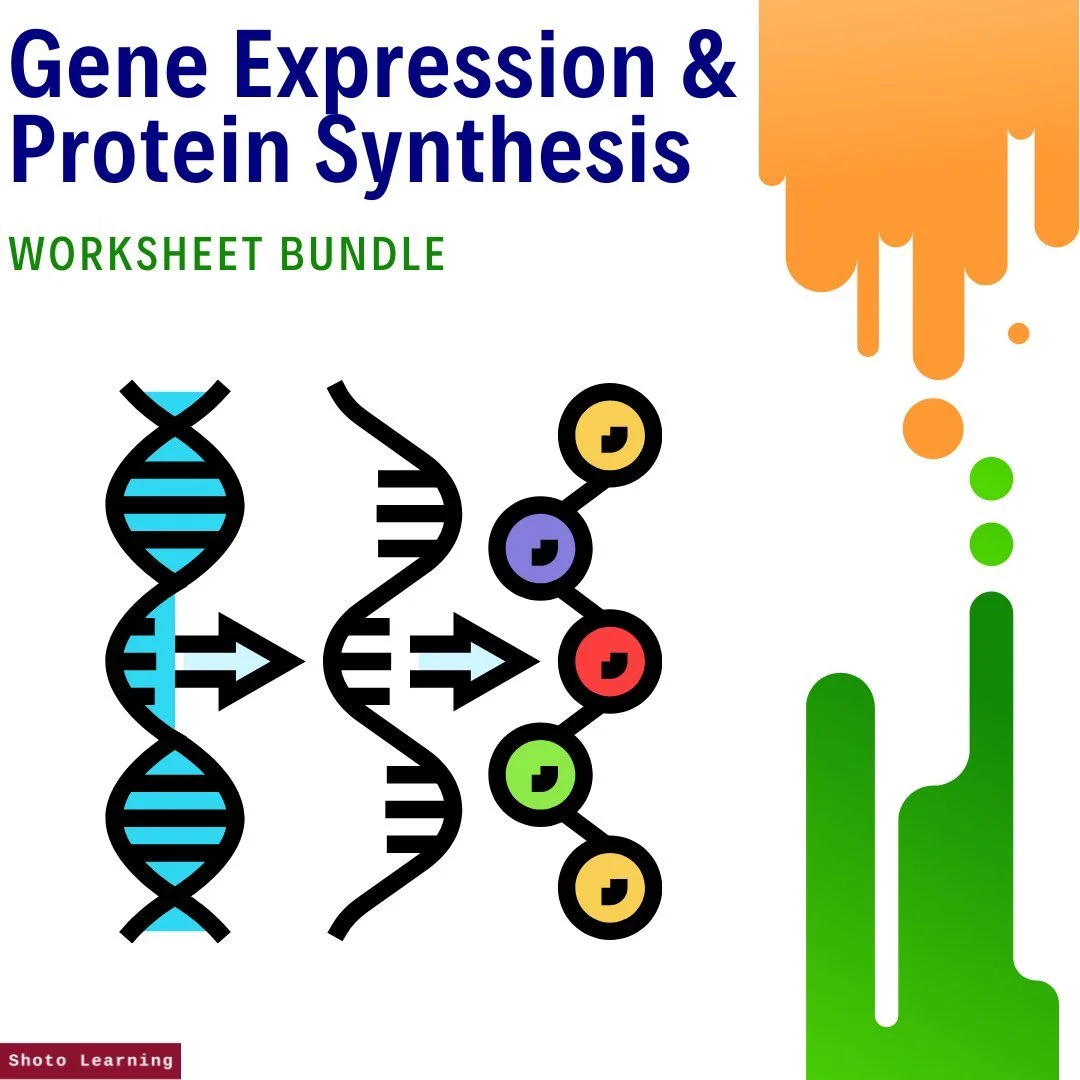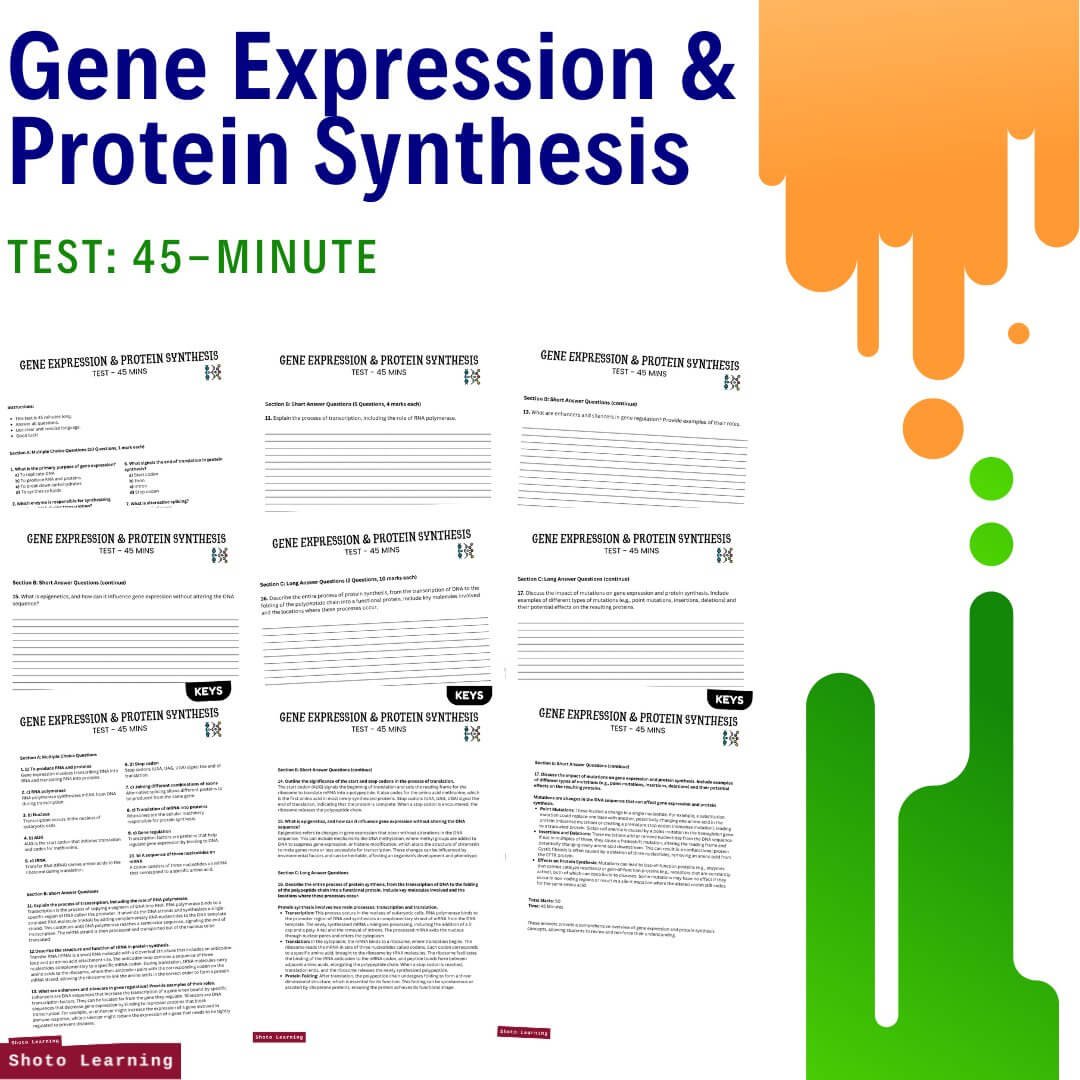Molecular Debates: Gene Expression & Protein Synthesis Worksheet
Engage in thought-provoking discussions on the intricacies of molecular biology with our "Molecular Debates" worksheet! Featuring 10 compelling debate topics related to gene expression and protein synthesis, this worksheet provides a platform for students to explore diverse perspectives and hone their critical thinking skills. Each debate question is accompanied by well-researched answers, offering comprehensive insights into the complexities of molecular processes. Whether you're a student seeking to deepen your understanding or an educator looking to facilitate meaningful classroom discussions, this worksheet is an invaluable resource for stimulating intellectual inquiry and fostering collaborative learning.
Key Features:
Ten Debate Topics: Explore a range of thought-provoking debate questions on gene expression and protein synthesis, covering key concepts and controversial issues in molecular biology.
Comprehensive Answers: Access detailed answers for each debate question, providing thorough explanations and supporting evidence to enhance understanding and facilitate informed discussions.
Critical Thinking Development: Cultivate critical thinking skills as students analyze, evaluate, and defend their viewpoints on complex scientific topics, fostering intellectual growth and academic excellence.
Classroom Engagement: Promote active participation and collaborative learning in the classroom by facilitating lively debates that encourage students to express their opinions and engage in respectful discourse.
Versatile Use: Suitable for individual study, group discussions, or classroom debates, this worksheet offers flexibility in implementation and can be adapted to various learning environments and instructional goals.
How to Use the Debate Worksheet:
Choose a Debate Topic: Select a debate topic provided on the worksheet that interests you or aligns with your lesson objectives.
State Your Position: Write down whether you agree or disagree with the chosen topic under "My Position."
List Supporting Points: Identify and note down three points that support your position under "Points that support my position."
Consider Opposing Points: Write three points that oppose your position under "Points that go against my position." This helps in understanding the other side of the argument.
Develop Counterarguments: Use "I could argue that" to think of counterarguments to the opposing points you listed.
Identify Weaknesses: Reflect on "Possible weaknesses in my argument" to anticipate any flaws or gaps in your reasoning.
Review and Practice: Use the provided answers to review possible arguments and practice debating with a partner or group.
Prepare for the Debate: Use your completed worksheet as a guide to structure your arguments and rebuttals for an upcoming debate.
These worksheets are designed to help students critically analyze different perspectives and build strong, persuasive arguments.
Ignite intellectual curiosity and promote meaningful dialogue with our "Molecular Debates" worksheet. Encourage exploration, stimulate debate, and deepen understanding of gene expression and protein synthesis in an engaging and interactive learning experience!
Pages: 12 pages
Don't miss out; order yours today!
Engage in thought-provoking discussions on the intricacies of molecular biology with our "Molecular Debates" worksheet! Featuring 10 compelling debate topics related to gene expression and protein synthesis, this worksheet provides a platform for students to explore diverse perspectives and hone their critical thinking skills. Each debate question is accompanied by well-researched answers, offering comprehensive insights into the complexities of molecular processes. Whether you're a student seeking to deepen your understanding or an educator looking to facilitate meaningful classroom discussions, this worksheet is an invaluable resource for stimulating intellectual inquiry and fostering collaborative learning.
Key Features:
Ten Debate Topics: Explore a range of thought-provoking debate questions on gene expression and protein synthesis, covering key concepts and controversial issues in molecular biology.
Comprehensive Answers: Access detailed answers for each debate question, providing thorough explanations and supporting evidence to enhance understanding and facilitate informed discussions.
Critical Thinking Development: Cultivate critical thinking skills as students analyze, evaluate, and defend their viewpoints on complex scientific topics, fostering intellectual growth and academic excellence.
Classroom Engagement: Promote active participation and collaborative learning in the classroom by facilitating lively debates that encourage students to express their opinions and engage in respectful discourse.
Versatile Use: Suitable for individual study, group discussions, or classroom debates, this worksheet offers flexibility in implementation and can be adapted to various learning environments and instructional goals.
How to Use the Debate Worksheet:
Choose a Debate Topic: Select a debate topic provided on the worksheet that interests you or aligns with your lesson objectives.
State Your Position: Write down whether you agree or disagree with the chosen topic under "My Position."
List Supporting Points: Identify and note down three points that support your position under "Points that support my position."
Consider Opposing Points: Write three points that oppose your position under "Points that go against my position." This helps in understanding the other side of the argument.
Develop Counterarguments: Use "I could argue that" to think of counterarguments to the opposing points you listed.
Identify Weaknesses: Reflect on "Possible weaknesses in my argument" to anticipate any flaws or gaps in your reasoning.
Review and Practice: Use the provided answers to review possible arguments and practice debating with a partner or group.
Prepare for the Debate: Use your completed worksheet as a guide to structure your arguments and rebuttals for an upcoming debate.
These worksheets are designed to help students critically analyze different perspectives and build strong, persuasive arguments.
Ignite intellectual curiosity and promote meaningful dialogue with our "Molecular Debates" worksheet. Encourage exploration, stimulate debate, and deepen understanding of gene expression and protein synthesis in an engaging and interactive learning experience!
Pages: 12 pages
Don't miss out; order yours today!
Engage in thought-provoking discussions on the intricacies of molecular biology with our "Molecular Debates" worksheet! Featuring 10 compelling debate topics related to gene expression and protein synthesis, this worksheet provides a platform for students to explore diverse perspectives and hone their critical thinking skills. Each debate question is accompanied by well-researched answers, offering comprehensive insights into the complexities of molecular processes. Whether you're a student seeking to deepen your understanding or an educator looking to facilitate meaningful classroom discussions, this worksheet is an invaluable resource for stimulating intellectual inquiry and fostering collaborative learning.
Key Features:
Ten Debate Topics: Explore a range of thought-provoking debate questions on gene expression and protein synthesis, covering key concepts and controversial issues in molecular biology.
Comprehensive Answers: Access detailed answers for each debate question, providing thorough explanations and supporting evidence to enhance understanding and facilitate informed discussions.
Critical Thinking Development: Cultivate critical thinking skills as students analyze, evaluate, and defend their viewpoints on complex scientific topics, fostering intellectual growth and academic excellence.
Classroom Engagement: Promote active participation and collaborative learning in the classroom by facilitating lively debates that encourage students to express their opinions and engage in respectful discourse.
Versatile Use: Suitable for individual study, group discussions, or classroom debates, this worksheet offers flexibility in implementation and can be adapted to various learning environments and instructional goals.
How to Use the Debate Worksheet:
Choose a Debate Topic: Select a debate topic provided on the worksheet that interests you or aligns with your lesson objectives.
State Your Position: Write down whether you agree or disagree with the chosen topic under "My Position."
List Supporting Points: Identify and note down three points that support your position under "Points that support my position."
Consider Opposing Points: Write three points that oppose your position under "Points that go against my position." This helps in understanding the other side of the argument.
Develop Counterarguments: Use "I could argue that" to think of counterarguments to the opposing points you listed.
Identify Weaknesses: Reflect on "Possible weaknesses in my argument" to anticipate any flaws or gaps in your reasoning.
Review and Practice: Use the provided answers to review possible arguments and practice debating with a partner or group.
Prepare for the Debate: Use your completed worksheet as a guide to structure your arguments and rebuttals for an upcoming debate.
These worksheets are designed to help students critically analyze different perspectives and build strong, persuasive arguments.
Ignite intellectual curiosity and promote meaningful dialogue with our "Molecular Debates" worksheet. Encourage exploration, stimulate debate, and deepen understanding of gene expression and protein synthesis in an engaging and interactive learning experience!
Pages: 12 pages
Don't miss out; order yours today!
Check out our blog for more information - Click Here




































